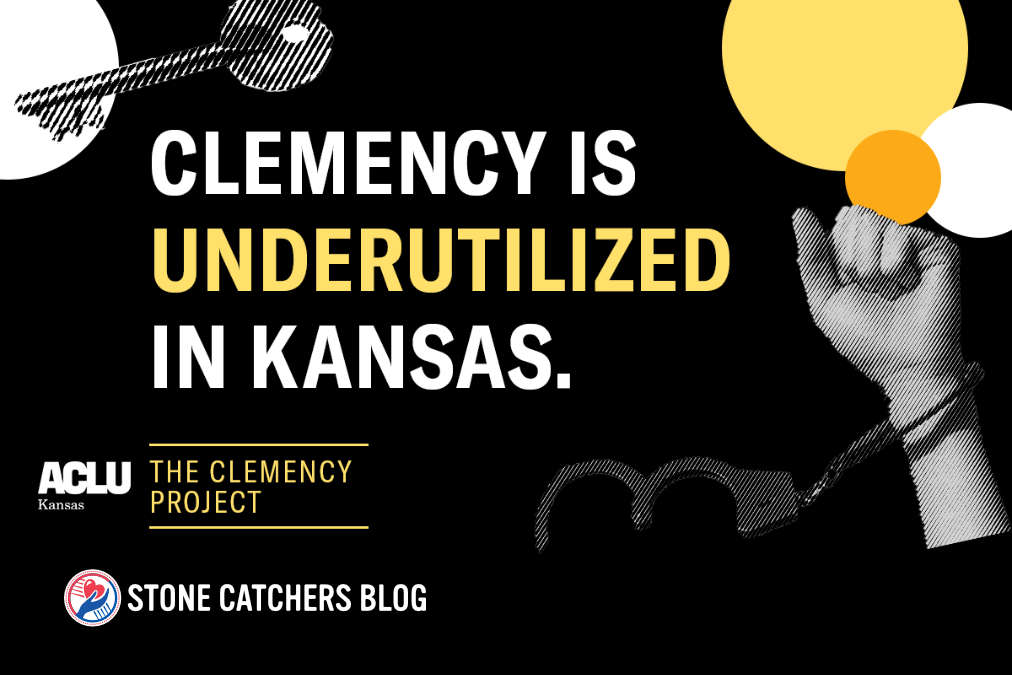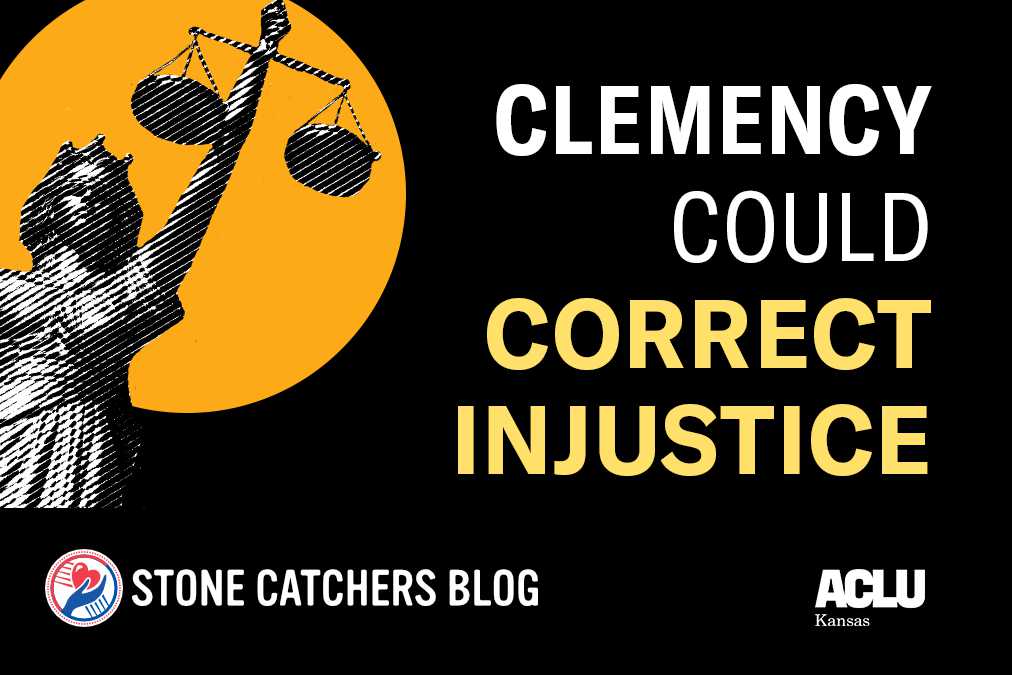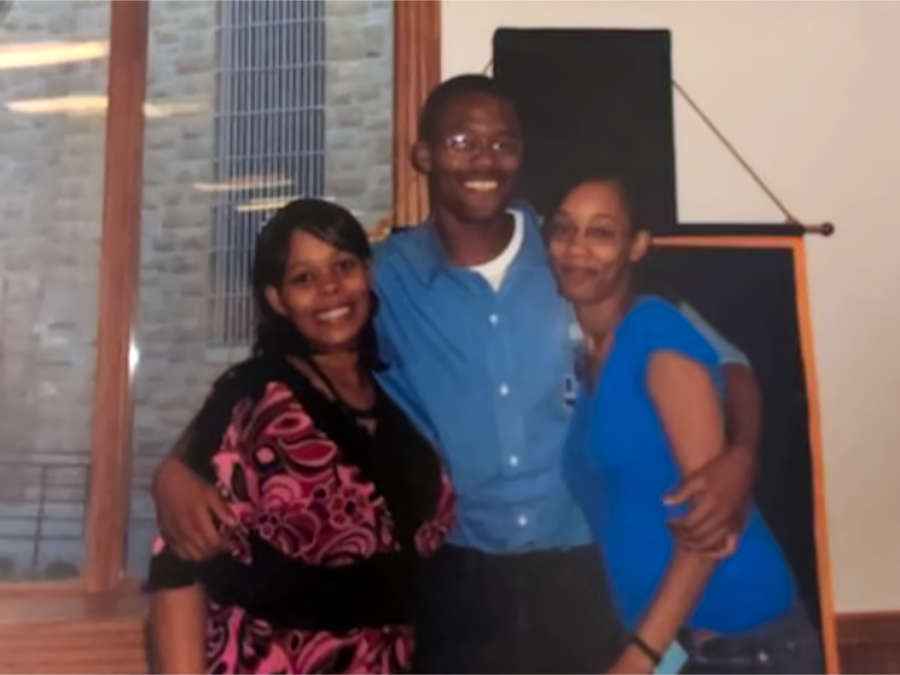Sherman Wright
Sherman Wright, 56, has been incarcerated at the Lansing Correctional Facility since age 23 for robbery and burglary charges. He moves more slowly and painfully now. He even has a Kansas Department of Corrections order stating he be placed only on bottom bunks because of his physical limitations.
Still, he has taken full advantage of DOC programming and job opportunities, learning welding and building maintenance, and how to train service dogs to assist the disabled.
Sherman, who has been imprisoned for 33 years—about 10 years longer than has ever been free—has finished 85 percent of his sentence. In a cruel twist, had he been sentenced under more recent sentencing guidelines, he likely would have been released by now.
The Kansas Sentencing Act of 1993 changed sentencing guidelines, shortening sentences for property crimes and lengthening them for violent crimes. But the Act was only made retroactive for 2,000 people, leaving hundreds of people like Sherman languishing under dated sentencing guidelines.
In that time, he has prepared for his eventual release by building skills and trying to give back.
He completed those welding and building maintenance certifications and served as main cook in the Lansing kitchen. He also has taken speech classes and delivered speeches to young people, encouraging them avoid his mistakes.
Sherman also has directed the United States Junior Chamber chapter where he raised money to support charitable causes.
His flagging health drives a sense of urgency for his release. He suffers from diabetes in addition to the knee and muscle pain.
He lost both parents and a sister while incarcerated, but plans to live with his surviving sister if he is released.
“I plan to pursue a job cooking — which is my passion — and continue seeking mentoring opportunities.”
Even with declining health, he has a chance at experiencing a life more defined by freedom than by imprisonment.
Date
Monday, March 1, 2021 - 4:00pm
Featured image
Show featured image
Hide banner image
Override default banner image
Related issues
Criminal Legal Reform
Show related content
Pinned related content
Petition of the Week: May 10th-14th
Petition of the Week: May 24-28
The Clemency Project: Stomach, and now, liposarcoma cancer
Tweet Text
[node:title]
Type
Menu parent dynamic listing
Show PDF in viewer on page
Style
Standard with sidebar
Show list numbers
Christopher McIntyre
Officials at the Hutchinson Correctional Facility initially explained away Christopher McIntyre’s extreme pain in his side and back in late 2020 as a muscle sprain. The dismissals continued even as he dropped a shocking 50 pounds.
After scheduling and rescheduling of a CT Scan of his abdomen and pelvis, and after weeks of relentless pain, later that year, facility medical staff said tests revealed multiple, late-stage, cancerous masses.
The 47-year-old, held in the El Dorado Correctional Facility on a single burglary charge, most certainly could die from his lung, liver, or colon cancer before his May 16, 2024 release date.
Clearly, a 47-year old man dying of cancer does not pose a threat to society. Yet despite his pleas for clemency and early release, Christopher remains incarcerated. His case raises deeper questions about our tolerance for the not-too-uncommon circumstances when accountability and punishment veer sharply into cruelty. The failure of KDOC to provide appropriate medical care in Christopher’s case is but one example of the system turning a criminal sentence into something even more punitive.
To date, there’s no medical plan to slow the stage 4 cancer’s rampage. When he was moved to the El Dorado Correctional Facility, Christopher went a month without receiving any cancer treatment, only pain-management injections. In fact, despite his illness, Christopher began chemotherapy treatment only this month—and only due to the consistent and extensive effort put forth by his sister and father, who at one point had to hire a lawyer to help advocate for proper medical care.
The KDOC says Christopher’s condition is “terminal.” He experiences constant nausea and weakness. He is wheelchair-dependent.
“My family is desperate for me to receive the care I need…”
But for all of his suffering, he’s more concerned for his parents, his siblings, and his five children suffering from a distance, as his life drips away.
“My family is desperate for me to receive the care I need and believes the facility is only trying to make me comfortable and wait for me to pass from this illness,” he said in his clemency application.
What do we gain from keeping Christopher imprisoned? The system can’t punish him worse than the cancer has and will. Why torture his family, which is eager to care for him and to make use of the limited time he has left?
Cruelty should have no place in rehabilitation.
Date
Friday, February 19, 2021 - 2:15pm
Featured image
Show featured image
Hide banner image
Override default banner image
Related issues
Criminal Legal Reform
Show related content
Pinned related content
ACLU of Kansas wins rare, KDOC release of Christopher McIntyre
Tweet Text
[node:title]
Type
Menu parent dynamic listing
Show PDF in viewer on page
Style
Standard with sidebar
Show list numbers
The ACLU of Kansas has filed 102 applications on behalf of people seeking clemency from Governor Laura Kelly. They represent a whole host of reasons why someone might be deserving of a second chance: they have been rehabilitated, or they were sentenced under old, draconian laws that are no longer applicable, or they were imprisoned for a low level offense and should have never been incarcerated in the first place.
We also have sought the release of 20 people for “functional incapacity,” a process which pushes applications first through multiple layers of facility and warden approval, then layers within the Secretary of Corrections’ office, and then on to the Prisoner Review Board. For these clients, their physical health has deteriorated and they seek release to seek medical and end-of-life care. Many don’t have very long to wait.
Clemency is about who these people are today, not what they did, as lawyer and activist Bryan Stevenson says, on their worst day.
Visit the Stone Catchers Blog bi-weekly to meet our clients and learn about their stories.
Rudy Anderson
Rudy Anderson, is 38 and has been incarcerated for a series of violent crimes he committed at age 15. He worked in the volunteer hospice program at Hutchinson Correctional Facility and for six years, where he bathed people, bound their wounds, changed bedding for the incontinent, and sat with them as their last caregiver and companion.
Over the years, he has completed certification through the Kansas Extension Master Gardener Curriculum, once growing the largest piece of produce at the Kansas State Fair. He has also held jobs in food service, and collected donations for numerous charities such as The Ronald McDonald House.
In Rudy’s current job, he’s responsible for the assembly of electrical wire harnesses for vehicles.
“While incarcerated,” he said in his clemency application, “I’ve tried to rehabilitate myself.”
We begin this series of profiles on our clients with Rudy not only because of his extraordinary efforts at rehabilitation, but also because if Rudy does not measure up to standards for release, then we need to uproot and rebuild those standards. From his work, his self-reflection, and his support system, it would be difficult to imagine a better clemency candidate.
Rudy has a large network of supportive family and friends and mentors. If released, he could live with his sister who also is a mental health therapist. A former teacher has offered Rudy a place in home with his family to help with Rudy’s transition.
Or, he could live on his own. During his incarceration, he has saved $10,000 through his numerous job opportunities from print shop work, to carpet cleaning, to house repair to making signs.
Rudy’s release request has urgency because he also has an underlying medical condition that makes him particularly vulnerable if he were to suffer a COVID-19 infection.
“I have suffered from asthma for a long time,” he said in his application. “My health is not what it used to be.”
He’s not who he used to be either. He’s worked hard to put his troubled teenage years behind him.
Mike McCloud
67 years old.
Michael McCloud spent 27 years in prison for several 1990 armed robberies over about a six-month period. He was released in 2018 when a Judge reviewed his case and ran his charges concurrently, rather than consecutively.
But that Judge’s ruling was successfully challenged by the Johnson County District Attorney’s office and if he does not receive clemency, the 67-year-old faces another 21 years in prison.
It is important to note that while the Johnson County DA’s office challenged Mike’s release, it also has indicated that it will support his clemency bid.
McCloud sidesteps nothing about those robberies. He admits that during a difficult time in his life, he made some awful choices.
“An officer told me I was the ideal kind of inmate who stayed out of trouble and tried to help others…”
What you may not know, however, is that McCloud repaid the he stole with money he made at a job he secured while incarcerated. Also, in all of that time, prison officials never once cited McCloud for a violation. He was a model prisoner.
“An officer told me I was the ideal kind of inmate who stayed out of trouble and tried to help others,” Mike said in his clemency application. “I was involved with the “Lifers’ group, which worked to promote positive relationships among facility residents, staff, and the community.”
Every month during his incarceration employment, he sent $300 to his aunt and uncle to save for him. By the time he was released, he had enough to buy a pickup.
Since his incarceration, Kansas reduced the prison sentences for the crimes for which he had been convicted. His 27 years served is more than double the time he would have been sentenced under the new law.
Returning to prison presents other dangers.
McCloud has diabetes. Getting locked up in our coronavirus-infested prison could cost him his life. The additional 21 years he faces if he is not granted clemency could constitute a death sentence.
Date
Friday, January 29, 2021 - 2:30pm
Featured image
Show featured image
Hide banner image
Override default banner image
Related issues
Criminal Legal Reform
Show related content
Pinned related content
Petition of the Week: May 24-28
Petition of the Week: May 10th-14th
The Clemency Project: "His continued incarceration raises more questions than his imprisonment ever answered."
Tweet Text
[node:title]
Type
Menu parent dynamic listing
Show PDF in viewer on page
Style
Standard with sidebar
Show list numbers
Pages








